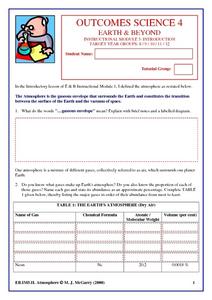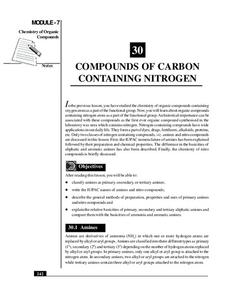Curated OER
Electron Dot Structures/Lewis Structures
In this elements worksheet, students practice drawing electron dot structures for atoms. Students draw the Lewis Structures for molecules with single and multiple bonds plus polyatomic ions. This worksheet has 33 problems to solve.
Curated OER
Organic Chemistry-Naming Hydrocarbons
In this naming hydrocarbons worksheet, students are given a table of the prefixes used for naming hydrocarbons based on the number of carbon atoms and their location. They then practice naming ten hydrocarbon compounds using the rules of...
Curated OER
Physical vs. Chemical Changes and "The Code"
In this chemical and physical change worksheet, students read about the differences between substances going through physical changes vs. chemical changes. They are given examples of each and evidence to look for in chemical changes....
Curated OER
Chemical Reactions and Burning Fossil Fuels
In this chemistry worksheet, students select answers to 24 multiple choice questions using the drop down box. They identify the different atoms involved in the chemical reaction.
Curated OER
Biochemistry Assignment
In this biochemistry worksheet, students complete a table by filling in the missing information about different elements. Students draw the Bohr diagram and the Lewis dot diagram for several atoms.
Curated OER
Stellar Fingerprints: the Spectra of Stars
Students explain how an element can be identified using emission spectra. They relate the emission spectrum of hydrogen to its absorption spectrum and identify hydrogen absorption lines in the spectrum of stars.
Curated OER
Lower the Trans and Increase the Omega-3s
Students identify the health risks associated with trans fats. In this adult health lesson, students examine food labels for hydrogenated oils content. They discuss the benefits and sources of omega-3s.
Curated OER
Electron Configurations and Orbital Diagrams
In this elements worksheet, students determine the electron configuration, orbital diagram for the highest sublevel, and the number of unpaired electrons in ground state atom for the given elements. This worksheet has 7 problems to solve.
Curated OER
Organic Chemistry Reactions
In this organic chemistry reactions worksheet, students are given a table with 8 different types of reactions that occur with organic molecules. Students answer 3 questions about the reactions given in the table and indicate which...
Curated OER
Interpreting Chemical Formulas
In this chemical formulas worksheet, students practice naming molecular compounds by their formulas and determine if a gas is a compound or an element. This worksheet has 13 fill in the blank questions.
Curated OER
Stoichiometry
In this stoichiometry learning exercise, learners calculate balance the chemical equations and then calculate the moles needed to complete or activate the chemical reaction. Students also calculate the volume or grams needed for each...
Curated OER
Properties of Covalent Compounds
In this compounds worksheet, students compare the differences between and ionic compound and a covalent compound. Students explain bond dissociation energy. This worksheet has 5 short answer questions.
Curated OER
Earth and Beyond
For this earth and beyond worksheet, students answer short answer questions about the atmosphere, the chemical compounds in Earth's atmosphere. Students visit different websites to conduct research of the discoveries of the scientist who...
Curated OER
Molecular Models
In this molecular formula worksheet students fill in a table describing elements and chemical formulas. They identify, elements by type and how they bond. The student analyze molecular formulas to identify the number of atoms and if the...
Curated OER
Balancing Chemical Reactions
In this balancing chemical reactions worksheet, students answer 12 questions about balancing reactions. They find the coefficients to balance atoms in equations, they balance reactions, they find the molecular mass of molecules and they...
Curated OER
Liquids and Solids
Students describe the properties of solids and liquids, and explain how a semiconductor works. In this atom lesson students demonstrate the bonding properties of carbon and silicon.
Curated OER
Effect of Concentration of the Reactants
Learners experiment to determine the effect of the frequency of collisions between atoms or ions of the reactants. They investigate the rate at which aluminum replaces hydrogen from a solution of hydrochloric acid.
American Chemical Society
Why Does Water Dissolve Sugar?
Did you know that if you wait long enough, the M on the outside of an M and M will float to the surface when submerged in water? Learners observe the sugar coating of an M and M while it is dissolving in water. They explain how this...
Curated OER
Student Reading - The Unique Properties of Water
Without water there would be no life on this planet. Biology learners find out why by reading this handout. Create a worksheet of questions to answer after the reading. Follow it up with quick demonstrations or laboratory activities that...
Curated OER
Gases and Plasmas
Students determine what plasma is and why the sun is made up of plasma. They recognize situations where plasmas are found in nature and made by man. They discuss why the sun is a huge ball of plasma and if there are different levels of...
Curated OER
Typical Numeric Questions for Physics I - Atomic Spectra
Seven practice problems are presented to physics pros in this assignment. Given the wavelengths, they perform computations for emission spectra. This brief worksheet makes an appropriate pop quiz.
National Institute of Open Schooling
Atomic Structure
Learners explain historical findings such as Rutherford and Bohr's contributions, explain wave particle duality, and formulate Heinsenberg's uncertainty principle. They also draw s, p, and d orbitals, explain more historical findings,...
National Institute of Open Schooling
Compounds of Carbon Containing Nitrogen
Amines are vital to humans because they help form amino acids, the building blocks of proteins. The 30th lesson in a series of 36 specifically focuses on the organic compounds that contain nitrogen. Learners classify amines and nitro...
Curated OER
WS 7.1 Kinetic-Molecular Theory of Gases/Pressure
In this kinetic molecular theory worksheet, learners summarize the points of the kinetic molecular theory, they answer questions about pressure, and draw diagrams to show how suction cups, drinking straws and barometers work.

























